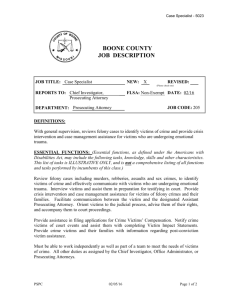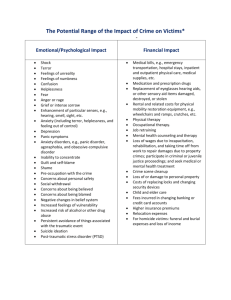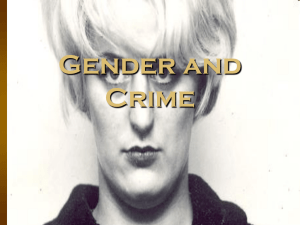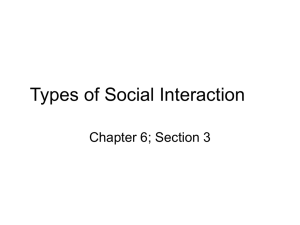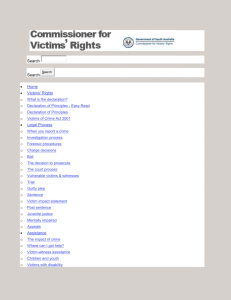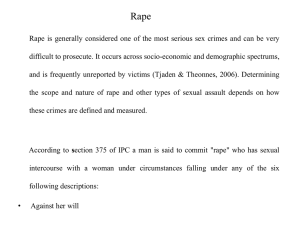The Proposed Study
advertisement
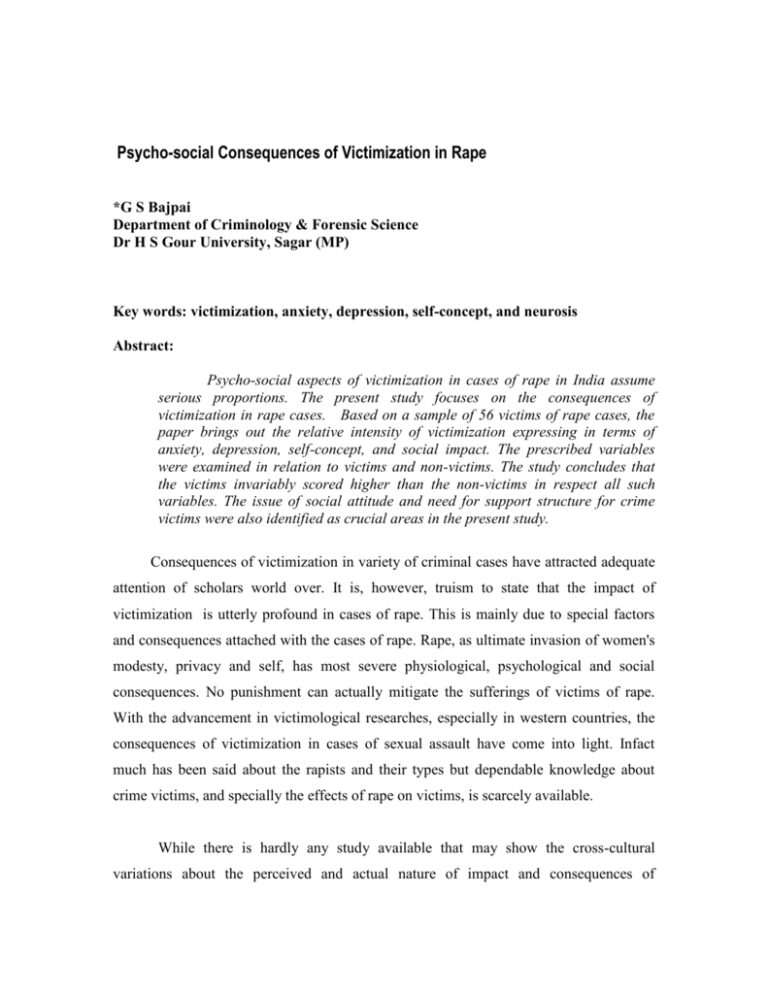
Psycho-social Consequences of Victimization in Rape *G S Bajpai Department of Criminology & Forensic Science Dr H S Gour University, Sagar (MP) Key words: victimization, anxiety, depression, self-concept, and neurosis Abstract: Psycho-social aspects of victimization in cases of rape in India assume serious proportions. The present study focuses on the consequences of victimization in rape cases. Based on a sample of 56 victims of rape cases, the paper brings out the relative intensity of victimization expressing in terms of anxiety, depression, self-concept, and social impact. The prescribed variables were examined in relation to victims and non-victims. The study concludes that the victims invariably scored higher than the non-victims in respect all such variables. The issue of social attitude and need for support structure for crime victims were also identified as crucial areas in the present study. Consequences of victimization in variety of criminal cases have attracted adequate attention of scholars world over. It is, however, truism to state that the impact of victimization is utterly profound in cases of rape. This is mainly due to special factors and consequences attached with the cases of rape. Rape, as ultimate invasion of women's modesty, privacy and self, has most severe physiological, psychological and social consequences. No punishment can actually mitigate the sufferings of victims of rape. With the advancement in victimological researches, especially in western countries, the consequences of victimization in cases of sexual assault have come into light. Infact much has been said about the rapists and their types but dependable knowledge about crime victims, and specially the effects of rape on victims, is scarcely available. While there is hardly any study available that may show the cross-cultural variations about the perceived and actual nature of impact and consequences of victimization in rape cases, general impression is that it does vary from society to society. Not due to the degree of sufferings but owing to the societal attitude and the way the victim can afford to handle the consequences of victimization. The state of criminal policy and criminal justice practices vis-à-vis rape is also relevant in this regard. Review of Research Works In a society like India where cultural expectations and societal attitudes govern and determine pattern of relations and behaviour, the incidence of rape becomes additionally critical. Instead of sympathy, victims of rape are invariably looked down upon. They tend to suffer a social stigma. Even their family members and relative tend to reject victims due to social pressure. Acceptability of victims becomes crucial in their homes and relationships. In the countryside victims are compelled to undergo a kind of purification. Reporting the matter to police is considered a daring act on the part of victim and their family members as this invariably results in bringing the matter to public which is perceived to cause social degradation and loss of public reputation of the family concerned. This is the reason why cases of rape are the most under reported phenomenon in India. The situation does not change much even in urban areas. Victims and their family members are also reluctant to report the matter to the police as the whole enquiry by the police and prosecution place the victim to face embarrassing and uncomfortable volley of questions. It is therefore understandable that researches on rape in India and especially those dealing with study of effects and implications are very few and far between. Psycho-social consequences have been studied in certain studies conducted abroad. The oft-quoted study by Holmstrom and Hurgess (1978) studied the institutional response to victims of rape. They found rape victimization as a trauma syndrome resulting into the total disruption of all aspects of life. This study showed the type of trauma undergone by victims of rape. The syndromes of behavioural, physical, psychological and social reactions were found to be highly stressful. In their study, "Against Rape", Medea and Thompson (1972) discussed psychological reactions of victims of rape. The authors however did not use any empirical technique but concluded that guilt, shock, anxiety and depression were certain prime psychological reactions observed in victims of rape. Similarly Barkas (1979) enumerated various mental disorders, confusion, sleeplessness, frigid emotionality and other personality disorders among victims of rape. Hazelwood and Burgess (1987) mainly dealt with the investigation of various aspects of rape. This study, interalia, highlighted the effects of rape on victims. This range of effects included (1) physical reactions like sleep pattern disturbances, eating pattern disturbances, physical symptoms (2) Emotional reactions like humiliation, degradation, guilt, shame embarrassment, self-blame, depression etc. (3) effects on physical life style, social life style, sexual life style and phobias. Fattah (1989) conducted a number of studies highlighting the concerns of crime victims. His study titled "The Plight of Crime victims in Modern Society" discussed psychological consequences of rape. Citing the studies by Bard, Morton and Sangrey, (1979), Symonds, (1980), Salasin, (1981), Fattah observed that shock, belief, numbness, fear etc. were certain experiences found in rape victims. It is worth noting here that such consequences as 'post-traumatic stress disorder' have been included in the Diagnostic Standards Manual of the Psychiatric Association. This syndrome describes the effect of extreme stressors on ordinary persons. Coming to Indian context, it can safely be said that rape as crime has been researched to a very limited extent. Particularly, victims of rape have received scant attention. Some sporadic mention of victims is, however, available in certain studies conducted on rape. A study by Verma (1979) on "Sex Offences in India and Abroad" has a Chapter titled "Rape and its Implications" but it did not have adequate quantitative information on victims and their problems. Mohanta (1993) has briefly touched this aspect but the discussion remained only impressionistic. A book by Ashraf (1997) on "Crime against Women" discussed about psychological, physical and social consequences of rape but no first hand data has been given to support arguments. A book, based on primary data, “Victim in the Criminal Justice Process" by Bajpai (1997) highlighted various types of psycho-social distress experienced by rape victims in Madhya Pradesh. The Proposed Study The present study is a modest attempt to underscore the effects and consequences of victimization in rape cases. The study is based on a project carried out by the author with the assistance from the University Grants Commissions, New Delhi. The present study is very specific. It does not intend to cover the whole spectrum of issues to relating to victimization in rape cases. It aspires to be an effort to objectively study the degrees of psychological and partly social consequences of rape in respect of a few victims. It purports to be an intensive analysis of certain cases with precise objectives and context. Objectives: The proposed study has the following objectives: 1. Study of the psychological consequences i.e., anxiety, fear, depression, self-concept conflict etc. of rape victims with the help of suitable psychological tests. 2. Assessment of social consequences of victimization in rape cases. 3. Comparison of attributes and reactions in victims and non-victims. 4. Suggestions of intervention strategies for diagnostic and rehabilitation purposes. Hypotheses: Following hypotheses are proposed to be verified in this study 1. Psychological consequences are particularly pronounced in case of victims of rape when compared with normal subjects. 2. Attitudes of family, peer groups and relatives towards victims of rape are not sympathetic and favourable. 3. Victims of rape continue to experience various kinds of consequences even after several months of incident. Sample: The sample of the present study comprises two groups of respondents i.e. victims of rapes and non victims (normal subjects who did not have similar experiences). The each group had 56 respondents. Thus the total sample was 112. The victims of rapes have been identified from the cases reported to the rural and urban police stations of Sagar town of state of Madhya Pradesh in India. The cases were selected between the years 1997 and 2000. The total cases of rape fulfilling our criteria were 143. However, only 56 respondents could be contacted and interviewed successfully. Data collection: A trained female interviewer for collecting the data for the work has been employed. To collect data, certain psychological tests concerning anxiety, depression, neurosis and self-concept were used. It is mentionable here that the job of data collection with victims was found to be a complex task. Specially in rural areas, the interviewer faced considerable resistance from all quarters and it took enormous time and repeated visits in the process of collection of requisite information. Tools The tests used in the study are suitable to local conditions and cultural milieu. The tests applied in the study were: Anxiety Test developed by Sinha and Sinha ( 1995), Self Concept Questionnaire ( Saraswat,1984) , Neurosis Measurement Scale ( Uniyal and Bisht,1989), Depression scale (IPAT,1976). Certain attitudinal information on the issues relevant to study has also been derived with the help of an Interview schedule comprising relevant scales. Findings and Observations The impact of victimization in rape is a well documented facet in the growing literature on victimology in the world. The consequences tend to manifest in terms of shock, vulnerability, anxiety, depression, loss of self-image, neurosis, adjustment problems etc. Social consequences of victimization in rape are typical to Indian setting and they invariably tend to that appear in the forms like social rejection, family problems, loss of work and wages. The findings based on the applications of various tests are presented below. 1. Depression is normally associated with the victims of rape. Table 1 shows that as many as 39.28 and 35.71 percent victims had high and average degrees of depression; this was only 14.28 and 26.28 percent respectively in case of nonvictims. The difference was found statistically significant ( p < 0.05). 2. The tendency of turning to neurotic amongst victims is considered as one of the manifest effects of victimization. To ascertain the degree of neurosis amongst victims the results of the application of NMS have been given in Table 2. As compared to non-victims (16.07 percent), the victims experienced higher degree of neurosis (32.14 percent). A significant t score ( p < 0.01) confirm the relevance of the results. 3. Rape is considered as a degrading experience for the victims. The victims invariably feel their image being lowered as a consequence of rape. The findings of Scale Measuring the Self Concept (SMSP) are shown in Table 4. Most victims had low self concept (42.85 percent) as compared to non-victims (19.64 percent). The difference was statistically significant (p < 0.001). 4. Anxiety is considered to be a major reaction among rape victims. The findings show (Table 3) that the victims had ‘extremely high’ (25 percent) or ‘high’ (42.85percent) levels of anxiety as compared to non-victims (3.4 & 14.28 percent respectively). Non-victims had significantly lower levels of anxiety comparing to victims (t score – 67.57; p < 0.005). 5. The significance of post victimization assistance to crime victims is self-evident. The assistance can be of several types. The support may emanate from family, neighborhood, hospitals, police, legal agencies or community. It was a matter of investigation to assess the status and type of support received by the victims after the incident. The data presented in Table 5 shows the relevant information. The support in almost all forms was either inadequate or the sources were indifferent towards victims. The apathy of family (N=30) neighbors (N=30), community (N=40)and police (N=30) was appalling .This shows that the victims did not have any dependable source to mitigate their sufferings. 6. The victims perceive the consequence of rape in different manners. The data presented in Table 6 depict the perceived impact of victimization in rape cases on the part of victims interviewed in this study. The findings show that the impact of loss of social image, economic hardship, tension and mental agony was remarkably felt by the victims. Discussion Rape as a form of sexual violence poses serious challenge to the system of criminal justice in India. The victims in this study narrated their problems and experiences while interacting with the agencies of criminal justice i.e. police, prosecutor and judiciary. Victims generally experience a kind of ‘secondary victimization’ while getting processed through the system of criminal justice. The case becomes far more serious in rural areas where the women police is almost non-existent and the cases are invariably handled by uncaring and unconcerned staff of police. The cases that reach to the courts have a different story. In a criminal justice system that is hardly a victim oriented one, the victims of sexual violence tend to face typical problems in the court like harassment, delay, adjournments and repeated court appearances, financial loss and waste of time. The climax approaches when the cross-questioning by the defence lawyer takes place. No decency seems to work. The whole process of cross-questioning put the victims to an extremely degrading experience. The judge remained a passive spectator having no say into the process. Notably, the victims have to narrate the same facts and details many times before the police, prosecution and judiciary. The plight of rape victims also have to do with inadequate laws bereft of provisions helping crime victims. The laws relating to rape and other forms of sexual violence against women have become a rather less reliable recourse for the victims. The problem features of laws relating to victims of rape and other forms of sexual violence can be summarized as below. 1. Laws relating to rape suffer some inherent drawbacks that are often exploited by the offenders. 2. Laws are hardly capable of providing any immediate assistance to crime victims. 3. Laws do not offer any substantial post victimization solution (care, compensation and rehabilitation package) in the direction of mitigating the consequence of rape. 4. The procedural intricacies and style of working of criminal justice system put the victims to bear additional brunt. 5. The most frustrating experience on the part of crime victims is seeing the accused getting acquitted in most instances. The rate of conviction in India in all kinds of cases is barely fifteen percent. 6. Despite all progressive judgment by the higher judiciary on these subjects, the victims of sexual violence continue to suffer. Conclusions & Recommendations There is a pressing need to have a well-structured scheme of intervention and assistance in case of rape victims. The study also presents a case of substantial over haul in the policies and practices in favour of crime victims. The findings of the study supported all the three hypotheses prescribed for verification in the present exercise. The victims had significant differences in terms of psychological consequences as compared to non victims (Hypo- 1). The attitudes of family, peer groups, relatives etc. towards victims of rape were discouraging in general. (Hypo- 2). Similarly, the victims of rape continued to experience the impact of victimization even after the lapse of considerable time (Hypo-3). Based on the findings of the present study, some suggestions emerge for consideration. The need to have a comprehensive system of victim assistance, in keeping the local requirements in view, is of importance. This kind system may be specially geared to address the issues of post victimization care and social neglect experienced by victims. The official policy and criminal justice practices may well be guided by the UN Declaration on Victims of Crime and Abuse of Power, 1985. The need to carry out further in-depth studies with a focus on the victims is also imperative. References: 1. Agrawal,K.G. ( 1991) :Scale Measuring Self Perception (SMSP), Agra: National Psychological Corporation. 2. Ashraf, N. (1997) : Crime Against Women Commonwealth Pub. New Delhi. 3. Bajpai, G.S. (1997): Victims in the Criminal Justice Process, Uppal New Delhi. 4. Barkas,J.L.(1979) : Victims, Peel Press, Bristal. 5. Chowdary,Uma(1984): An Indian Modification of the Thematic Appreciation Test, Calcutta: Saraswati Press. 6. Fattah,E.A.(1989) : The Rights of Crime Victims in Modern Society: New York:St Martin Press. 7. Govt. of India (1996) : Crime in India, NCRB, New Delhi. 8. Holmstrong, L. L. and Burgess, A.W.(1978) :The Victims of Rape John Wiley, New York. 9. Hazelwood, R.R. and Burgess, A.W. (1987): Practical Aspect of Rape Investigation, Elesevier, New York. 10. Institute for Personality and Ability Testing (IPAT) ( 1996 ) : Personality Assessment Inventory ( Depression Scale), Illinois. 11. Lurigio,A.J., Skogan,W.and Davis,R.C.(1990) : Victims of Crime: Problems, Policies and Programme (ed.),New Delhi: Sage. 12. Mahanta J.(1993) : Sex,Crime and Society, Ashish Pub. New Delhi. 13. Medea, A. and Thompson,K.(1972) : Against Rape,Peter Owen London. 14. Saraswat, R.K ( 1984) : Self Concept Questionnaire: Agra, National Psychological Corporation.. 15. Sinha, A. K. P.& Sinha, L. N. K. (1995) : Sinha’s Comprehensive Anxiety Test (SCAT): Agra, National Psychological Corporation. 16. Uniyal M. P.& Bisht, Abha Rani ( 1989) : Neurosis Measurement Scale, Luknow: Ankur Psychological Agency. 17. Verma, P. (1979): Sex Offences in India and Abroad, B.R. Pub .New Delhi.

